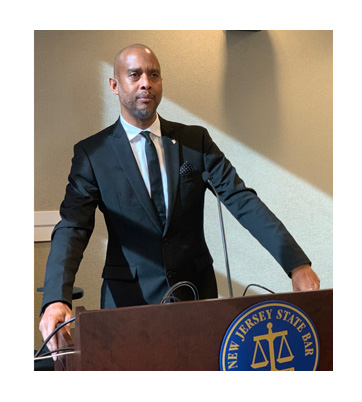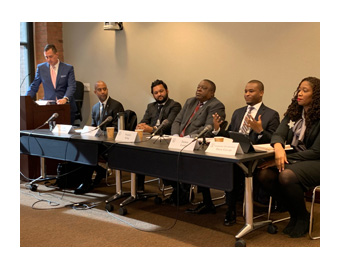Four days before Rosa Parks refused to give up her seat on an Alabama bus, she attended a packed meeting at the Dexter Avenue Baptist Church where organizers talked about a 14-year-old Chicago boy named Emmett Till who was kidnapped and lynched while visiting family in Mississippi.
 Parks would tell Till’s mother, Mamie Till-Mobley, that young Emmett’s brutal murder was foremost in her mind when she stayed seated on that bus, sparking the landmark 381-day Montgomery Bus Boycott.
Parks would tell Till’s mother, Mamie Till-Mobley, that young Emmett’s brutal murder was foremost in her mind when she stayed seated on that bus, sparking the landmark 381-day Montgomery Bus Boycott.
And eight years later, when organizers were planning the March on Washington, the selection of the date – Aug. 28 – was no accident. It was the anniversary of Till’s brutal murder.
“The story of Emmett Till was a blueprint to our liberation,” said filmmaker Keith Beauchamp at a Nov. 13 program at the New Jersey Law Center. That liberation, he said, is something that communities of color are still fighting for and to progress, “we must go back and understand what sparked the movement.”
Beauchamp’s talk was part of a New Jersey Institute for Continuing Legal Education program on the murder of Till and what lawyers could learn from that case. The seminar was moderated by Thomas H. Prol, a past president of the New Jersey State Bar Association, and also featured Dara Govan, an assistant U.S. attorney in Newark; Stanley King, of King & King in Woodbury; James A. Lewis V, of Pennington Law Group in South Orange; and Amol Sinha, executive director of the American Civil Liberties Union of New Jersey.
The panel reflected on the relevance of the case, as well as the challenges of trying hate crimes and civil rights cases in the courts today.
In 1955, 14-year-old Till allegedly whistled at Carolyn Bryant, the co-owner of a candy store with her then husband, Roy Bryant. Three days later, Roy and his half-brother kidnapped Till in the middle of the night, and tortured and shot him before dumping his body in the Tallahatchee River, weighed down with a cotton gin fan tethered to his neck with barbed wired.
The two men were acquitted by an all-white male jury in a trial that, Beauchamp said, was really more about identifying Till’s body than it was about the lynching and kidnapping itself. Months later, the pair confessed to the murder in a paid interview for Look magazine.
Beauchamp made the 2005 documentary “The Untold Story of Emmett Louis Till,” and is currently working on a feature film titled “Till.” The Till case was twice reopened by the U.S. Department of Justice: once in 2004, citing Beauchamp’s documentary, and again in 2018, after Carolyn Bryant Donham, (now divorced and remarried), recanted parts of her account in a book about Till’s murder by Timothy B. Tyson, a Duke University researcher.
The 2004 case closed without any indictments. The 2018 case is still active.
Beauchamp’s documentary is available on YouTube and he urged everyone to watch it. “I put it there for a reason.